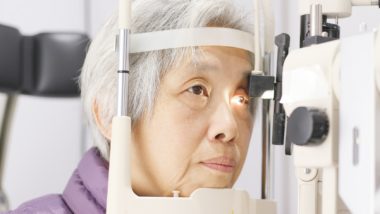Top Class Actions’s website and social media posts use affiliate links. If you make a purchase using such links, we may receive a commission, but it will not result in any additional charges to you. Please review our Affiliate Link Disclosure for more information.
A study released in 2018 by the American Academy of Ophthalmology may indicate a link between interstitial cystitis medication Elmiron and a serious eye condition known as macular degeneration. Read on to learn about symptoms of macular degeneration.
Macular Degeneration Definition
The macula is a small but important part of the eye responsible for allowing you to see small details, read, and process colors. The macula is located in the central area of the retina, in the back of the eye, and is approximately 5 mm in diameter.
Although this part of the eye is tiny compared to the rest of the eyeball, it plays a very important role in vision. It’s responsible for focusing the light that enters the eye through the cornea and lens. It is also where the images that are seen by the eye are created before being sent to the brain via the optic nerve.
The macula has many photoreceptor cells, or cells that detect light and send signals to the brain to interpret this light as images. These cells are responsible for most of the color vision that humans have. It is due to the highly sophisticated structure of the macula that humans have 20/20 vision. However, if the macula is damaged, it may lead to serious vision loss and other eye problems. This damage is often caused by macular degeneration, a disease that worsens over time.
There are several types of macular degeneration, though the disease generally falls into one of two categories: wet and dry. Each type has different symptoms and may lead to different types of vision loss.
Early Symptoms of Macular Degeneration
Often, an eye doctor may notice the symptoms of macular degeneration before the sufferer notices any change in vision or vision loss. However, there are some common signs that people who are at risk of developing the disease may be able to watch for.
Early symptoms of macular degeneration may include difficulty reading fine print, difficulty driving, a noticeable worsening of vision, blurry vision, different color perception, sensitivity to glare, straight lines appearing to be wavy, or dark areas in the center of your field of vision. Initial symptoms may vary depending on the type of macular degeneration.
Wet Macular Degeneration Symptoms
People with wet macular degeneration have leakage from the blood vessels underneath their macula. This leakage results in blood and other fluid seeping into the retina, where it may become scar tissue.
Wet macular degeneration symptoms may include vision changes causing straight lines to appear wavy, blind spots, and the loss of central vision.
 Dry Macular Degeneration Symptoms
Dry Macular Degeneration Symptoms
Dry macular degeneration is more common, less severe and is almost always the initial stage. People with dry macular degeneration often have yellow deposits in their macula. These deposits may grow in size or number, and cause dimming or distortion of the vision. People with dry macular degeneration may experience atrophy of the light-sensitive cells in their eyes, leading to blind spots or the loss of central vision.
Is Macular Degeneration Genetic?
There may be many causes of macular degeneration. According to the American Academy of Ophthalmology, it is likely that genetic factors play a role in who will develop the condition.
Approximately 30 genes have been identified that may determine whether someone is at risk of developing macular degeneration. People who have at least one parent that has been diagnosed with the condition are approximately twice as likely to contract it themselves. Additionally, diet and lifestyle may also play a role.
While the disease can affect people of any age, genetic macular degeneration is often age-related. Age-related macular degeneration is the leading cause of permanent vision loss in people over the age of 60. Another type of macular degeneration, known as Stargardt disease, may affect the vision of children and young adults.
The condition may also be caused by taking certain medications, including Elmiron, a drug used for the treatment of interstitial cystitis.
Interstitial Cystitis Treatment and Macular Degeneration
Interstitial cystitis is a chronic and painful condition that causes bladder pain, pelvic pain, and bladder pressure. In addition, interstitial cystitis may also cause sufferers to feel a persistent, urgent need to urinate. The condition often affects women and can lead to a serious decrease in their quality of life.
Elmiron is the only drug approved by the U.S. Food and Drug Administration (FDA) and Health Canada to treat interstitial cystitis. While it’s not known exactly how Elmiron works, it is believed that it may coat the bladder wall in a protective layer, reducing irritation and inflammation. However, Elmiron may also cause serious side effects.
Though the drug has been on the market for decades, recent research has shown that it may come with more risks than initially thought. According to a study from the American Academy of Ophthalmology, long-term use of Elmiron may result in vision damage including macular degeneration. Patients at Kaiser Permanente in California who had taken Elmiron were found to have a potentially higher than average risk of developing macular degeneration. According to the study, some 25 percent of the patients showed signs of eye damage after long-term use of Elmiron.
Kaiser Permanente researchers located 140 patients who had taken an average of 5,000 Elmiron pills, and 91 agreed to undergo an exam for the study. Of the 91, 22 showed signs of Elmiron toxicity and eye damage. The amount of damage caused by the drug may be related to the dosage amount and the length of time that the patient took the medication.
Many Elmiron patients who have suffered Elmiron eye damage may have been misdiagnosed with a different form of macular degeneration. Dr. Robin Vora, chair of ophthalmology at Kaiser Permanente and a co-author of the study, explained that Elmiron may be linked to a range of eye problems, including difficulty reading and adjusting to different light, among others. Dr. Vora explained that it’s challenging to determine whether these conditions may be linked to medication because they present much like age-related macular degeneration, a much more common disease, Canada’s CTV News reported.
Dr. Vora explained that the stakes of this information are high. Damage to the retina is not fixable, and because patients tend to take Elmiron to manage their condition over a long period of time, they may risk severe damage, she says. She said she was surprised by the extent of the Elmiron-induced macular degeneration. In her words, “at the worst, worst state this mimics really severe macular degeneration and we were a little bit shocked to see that a medicine could cause this much damage.”
Other urology experts say they were only made aware of the drug’s possible risks in the past couple of years. Dr. Curtis Nickel, a urology professor at Queen’s University and the Canada Research Chair in urologic pain and inflammation, said that the possible appearance of symptoms of macular degeneration seemed to be a condition linked to interstitial cystitis itself, not the medication used to treat it.
Elmiron Warning Added
A number of Elmiron lawsuits have been filed against the drug maker by patients who alleged symptoms of macular degeneration after taking the drug. However, it wasn’t until June of 2020 that a warning was added.
The IC Network, a publication by the Interstitial Cystitis Network (ICN), reports that, after a number of studies and publications, as well as a petition to the FDA and numerous patient reports, a warning was added to the Elmiron label about the risk of eye disease. The label warns of retinal pigmentary changes, noting that problems appear to be most associated with long-term use, but have also been found in short-term use of the drug.
The Elmiron label now warns patients to be aware of the following symptoms while taking the drug:
- difficulty reading
- slow adjustment to low or reduced light environments
- blurred vision
The warning label also urges caution when it comes to prescribing Elmiron for patients with retinal pigment changes due to other causes. Additionally, if patients develop retina changes, the label instructs doctors to re-evaluate the use of the drug.
“This is a tremendous success,” writes Jill Osborne, M.A., and founder of ICN. “For some patients, long-term Elmiron use has led to significant, potentially permanent, vision changes and/or blindness. It encourages urologists to ask patients if there is any family history with eye disease and recommends baseline retinal examinations for every patient within six months of beginning ELMIRON treatment and on an on-going basis to determine if their retinas are being affected.”
If you or a loved one has developed symptoms of macular degeneration after taking Elmiron, you may be eligible to hire an experienced attorney to review your case. Some victims may be eligible to pursue litigation against the manufacturer of the drug, and may potentially receive compensation for injuries, pain and suffering, and medical expenses.
Join an Elmiron Side Effects Lawsuit Investigation
If you took Elmiron and developed pigmentary maculopathy, you may qualify to participate in an Elmiron side effects lawsuit investigation.
Fill out the form on this page for a FREE case evaluation.
ATTORNEY ADVERTISING
Top Class Actions is a Proud Member of the American Bar Association
LEGAL INFORMATION IS NOT LEGAL ADVICE
Top Class Actions Legal Statement
©2008 – 2024 Top Class Actions® LLC
Various Trademarks held by their respective owners
This website is not intended for viewing or usage by European Union citizens.
Get Help – It’s Free
Join a Free Elmiron Lawsuit Investigation
If you qualify, an attorney will contact you to discuss the details of your potential case at no charge to you.
PLEASE NOTE: If you want to participate in this investigation, it is imperative that you reply to the law firm if they call or email you. Failing to do so may result in you not getting signed up as a client or getting you dropped as a client.
E-mail any problems with this form to:
Questions@TopClassActions.com.
Oops! We could not locate your form.


 Dry Macular Degeneration Symptoms
Dry Macular Degeneration Symptoms










